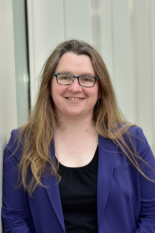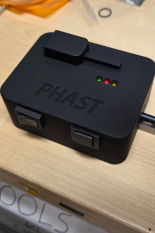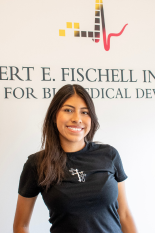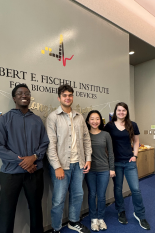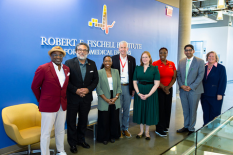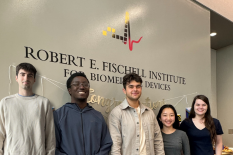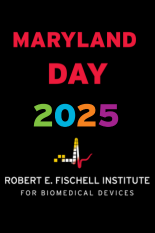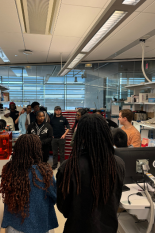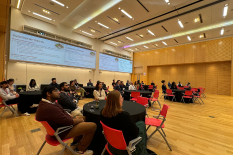News Story
Professor Chris Jewell Accepts New Position in Fischell Institute
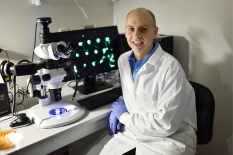
Fischell Institute Fellow and MPower Professor Chris Jewell has accepted a newly created position in the Fischell Institute. Jewell is now the Robert E. Fischell Institute Professor of Translational Engineering, effective April 1, 2024.
In this professional track faculty position, Jewell will further his exceptional research activities, while also creating new connections and opportunities across Maryland’s biotechnology and entrepreneurship ecosystems.
“This represents an exciting shift for the next phase of my career, where I can focus on bringing new technologies to patients, particularly those with autoimmune disease,” said Jewell.
He is the perfect person to step into this new role in the Fischell Institute.
“Translating technologies to practice has been of principal interest to Chris throughout his career, one that has included innovative research, mentoring on campus, and service to the community,” said Fischell Institute Director William Bentley. “This natural professional progression for him aligns well with the goal of the Fischell Institute to bring inventions to market, as envisioned by institute benefactor Robert E. Fischell. More importantly, though, this transition will enable Jewell to drive contributions to better health and hopefully save lives.”
Jewell was previously appointed as Minta Martin Professor in the Fischell Department of Bioengineering and the Miegunyah Distinguished Visiting Fellow at the Peter Doherty Institute for Infection and Immunity at the University of Melbourne (Australia) in 2021. He has also served as the Associate Chair for Research and the BioWorkshop Core Instrumentation Facility Creator and Director at the University of Maryland.
After earning his Ph.D. in chemical engineering from the University of Wisconsin, Madison in 2008, Jewell joined the Boston Consulting Group in New York City as a consultant in the healthcare division. There, his work focused on R&D strategy development for global pharmaceutical and biotechnology clients. In 2009, Jewell accepted a postdoctoral research fellowship in the Ragon Institute at the Massachusetts Institute of Technology (MIT) to begin vaccine research. He was also appointed as a visiting scientist at Harvard University in the Center for Vaccine Research.
In 2012, Jewell launched his lab at the University of Maryland, leading groups in engineering and immunology over the past decade. The lab’s work centers on using biomaterials and new tools to study immune processes and pioneering these technologies for next-generation therapeutic vaccines that can safely and selectively combat autoimmunity and cancer.
Jewell’s research has received significant support and many firsts at the university.
“Chris was one of the first faculty members to receive funding from a health-related private foundation,” said Bentley. “He was initially supported by Alex’s Lemonade Stand, which is dedicated to curing childhood cancers. He also won support from the Damon Runyon Foundation, which identifies scientists with the highest potential to revolutionize how we prevent, diagnose, and treat all forms of cancer. Chris has pioneered a number of technologies, including devices to interrogate and control the immune system. These efforts have led to multiple patents and companies aimed at bringing new options to patients. Along these lines, I believe he was the first campus awardee of an NIH Concept-to-Clinic award, which wraps entrepreneurial support (financial and educational) around successful NIH-funded investigators and their teams to start companies based on technology born out of NIH research grants.”
With more than $25 million in funding, Jewell’s research has resulted in more than 120 published papers and numerous patent filings. His work is published in Nature, Nature Biotechnology, Science Immunology, Nature Materials, Cancer Cell, PNAS, Advanced Materials, Nature Communications, ACS Nano, Trends in Immunology,and others. Jewell’s efforts have been recognized with more than 50 awards for research, innovation, teaching, and education, including the Presidential Early Career Award for Scientists and Engineers (PECASE), awarded by the White House.
Jewell is currently on leave of absence, serving as Chief Scientific Officer at Cartesian Therapeutics.
“As the founding Fischell Institute director, I am immensely grateful that Chris is pursuing this path,” said Bentley. “Our institute has a mission that was envisioned by our benefactor Robert E. Fischell—to create and develop devices to enhance human health. The focus is not squarely on research, but the translation of research. Having a faculty member of Chris’ stature, enthusiasm, and energy, who is now in a position that enables focused time for translation, is a game-changer.”
Published May 22, 2024
